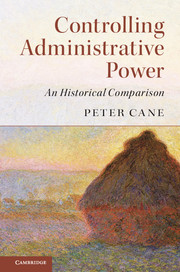Book contents
- Frontmatter
- Dedication
- Contents
- Preface
- Table of cases
- Table of legislation
- 1 Introduction: concepts and methodology
- 2 The English system of government
- 3 The US system of government
- 4 The Australian system of government
- 5 The development and institutional structure of control regimes
- 6 Administrative interpretation
- 7 Administrative fact-finding and policy-making
- 8 Administrative rule-making
- 9 Administrative adjudication
- 10 Private law controls
- 11 Controlling information
- 12 The New PublicManagement
- 13 Controlling the controllers
- 14 Concluding reflections on methodology and themes
- Bibliography
- Index
8 - Administrative rule-making
Published online by Cambridge University Press: 05 March 2016
- Frontmatter
- Dedication
- Contents
- Preface
- Table of cases
- Table of legislation
- 1 Introduction: concepts and methodology
- 2 The English system of government
- 3 The US system of government
- 4 The Australian system of government
- 5 The development and institutional structure of control regimes
- 6 Administrative interpretation
- 7 Administrative fact-finding and policy-making
- 8 Administrative rule-making
- 9 Administrative adjudication
- 10 Private law controls
- 11 Controlling information
- 12 The New PublicManagement
- 13 Controlling the controllers
- 14 Concluding reflections on methodology and themes
- Bibliography
- Index
Summary
Types of administrative rules
Rules made by administrative officials and agencies (‘administrative rules’) may be divided into two broad categories: hard law (or ‘hard rules’) and soft law (or ‘soft rules’). In each of our comparator systems, the distinction between hard and soft administrative rules is commonly drawn in terms of the different legal status and effect of the two types of rules. To the extent that they are consistent with superior hard rules of law (constitutional, statutory and common law), the legal effect of administrative hard rules is the same as that of statutory rules. Although hard administrative rules do not have the same legal status as statutory rules, they have the same legal effect. The reason why hard administrative rules lack the legal status of statutory rules and the reason why they have the same legal effect as statutory rules are the same, namely, that they are products of the exercise of statutory power to make rules. By contrast, to the extent that they are consistent with hard rules of law, the legal effect of soft administrative rules is similar to that of judge-made common law rules in that they are flexible, conditional and revisable at the point of application. However, they do not have the same legal status as judge-made common law rules because they are not products of the exercise of legal power to make rules. Whereas the power to make legal rules ‘incrementally’ (as a by-product of deciding individual cases) is an inherent feature of judicial power, it is not an inherent feature of executive power. Moreover, executive officials and agencies have legal power to make rules ‘comprehensively’ (as a legislature typically does) only if it is conferred on (‘delegated to’) them by the legislature. On the other hand, in systems (unlike the Australian) in which truly judicial power can be conferred on executive officials and agencies, this power carries with it the power to make legal rules incrementally.
In English and Australian terminology, administrative hard rules are most often referred to as ‘delegated’ or ‘secondary’ legislation in contrast with ‘primary’ legislation made by Parliament. Soft rules are sometimes referred to as ‘tertiary’ or ‘quasi-’ legislation but more commonly by various terms such as ‘policies’, ‘guidelines’, ‘directions’ and the like. In US terminology, hard rules are often called ‘regulations’ or ‘legislative rules’.
- Type
- Chapter
- Information
- Controlling Administrative PowerAn Historical Comparison, pp. 269 - 324Publisher: Cambridge University PressPrint publication year: 2016



